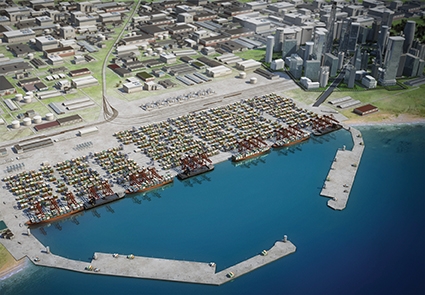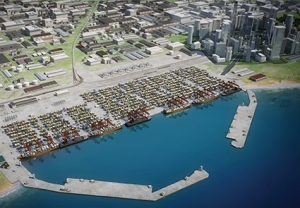Anaklia Deep Sea Port: Reviving Georgia’s Transport Potential
Regarded as a game changer, the project of the century, unprecedented for the country, and expected to create a new reality both for Georgia and for the entire region, the Anaklia Deep Sea Port project, construction of which is expected to be officially launched on December 20, will not only promote a significant economic impact on Georgia’s development, but to be a major booster for trade and transport interactions between Georgia and other countries. It is touted as the next project set to reshape and revive Georgia’s transit potential, opening some of the major markets from the South Caucasus to Central Asia and North Iran. Anaklia Deep Sea Port, ambitious as it may sound, is to become a gateway between Europe and Asia, an emerging transport and logistics hub of the region, and with the Silk Road increasingly developing and shifting the whole trade environment between China and Europe, with Anaklia Deep Sea Port, Georgia is to fully benefit from the Silk Road’s potential.
GEORGIA TODAY met with experts Jaba Tarimanashvili, Business Analyst, Director of Maritime Services and Transportation Company Trans Logistic; Vaso Urushadze, Executive Director, HUB Georgia; and Paata Tsagareishvili, Transport Corridor Research Center Director, to discuss the significance of the Anaklia Deep Sea Port project specifically from an international transportation and logistics development angle and the opportunities it brings to Georgia.
We asked why the Anaklia Deep Sea Port construction is a necessary measure for Georgia and what the advantages are to existing ports in the country.
“Anaklia Deep Sea Port construction is not an event of short-term importance, the more so when compared to Poti Port,” said Vaso Urushadze. “In reality, such comparison is not relevant, because stevedoring activities alongside the majority of berths in Poti, is not managed by port operators themselves. On the contrary, stevedoring services are provided by private companies, which in many cases, leads to the threat of interest conflicts and monopolized approaches, which negatively affect not only the performance of the port and internal market, but also damages the efficiency of the international transport corridor passing through Georgia. Owners of cargo often try to avoid Georgia and deliver goods by sea-river transport using the Volga-Don canal to the countries surrounding Caspian Sea, or from Iran, passing Azerbaijan and transporting goods to Central Asia. Healthy competitiveness and transparency will reduce these barriers, and Anaklia Deep Sea Port will bring a solid positive impulse to increase the turnover of goods”.
“Batumi and Poti Sea Ports are located in the centers of their respective cities; a fact which automatically affects their development,” said Jaba Tarimanashvili. “The freight is usually transshipped based on a direct type of re-loading ‘vessel to rail wagon,’ which in turn drastically decreases the efficiency of cargo-handling operations. In Poti Port, off-dock container terminals are located outside the port, and that makes the cost of transportation of goods from ships to container terminals 50% higher than handling bulk cargoes. While freight containerization is a practice actively used in the world nowadays, making it logistically easy to deliver goods to the end user, sea ports try to make the costs for stevedoring services equal or to even overcome the bulk cargo operation costs. Right now, existing terminals in Georgia don’t have that capacity, partly because of the insufficient safe draft in the harbor and lengths acceptance alongside berth, which hinder handling capabilities and the possibility to accommodate larger ships, and making the logistics chain complicated due to the location of the sea ports and limiting possibilities for their development. Anaklia Deep Sea Port, with its unlimited spatial capacity and the correct legislative development of its special economic zone, is to establish new standards in the region, and bring the Georgian transport industry to a new stage of development”.
“In the regional arena where Anaklia Deep Sea Port would compete, there are several sea ports (Bandar Abbas, Iran; Mersin, Turkey; Odessa, Ukraine; Baltic ports; Novorossiysk port in Russia, and of course Poti and Batumi ports,” Tsagareishvili says. “All of them want to take over cargo for Central Asia and they more or less manage to do so. That’s why Anaklia Deep Sea Port has an advantage due to natural factors, due to political sanctions against Russia/ Ukraine, US/Iran, and also, of course due to Anaklia Port being a Deep Sea Port of 16m depth, a very important factor for receiving container ships. All of these together put Anaklia Deep Sea Port in an advantageous position”.
When asked about how the Anaklia Deep Sea Port could possibly influence the process of Georgia becoming an international transport and logistics hub in the region, Tarimanashvili points out that the Port’s advantage, as facilitator of international transport corridor development is important. But it is important that before it opens, following finalization of the first phase of construction, the country needs to expand its transportation of goods beyond Armenia, Azerbaijan and Georgia and to work on gaining the right, without un-stuffing and reloading to rail wagons, to deliver containerized shipments towards Central Asia. “Unless the country has access to Central Asian countries, there will be no quantitative development,” he says.
From Tarimanashvili’s perspective, it may be difficult for Anaklia Deep Sea Port to compete solely based on its technical or natural advantages without appropriate legislation and institutions functioning. “It’s an important factor to note that the problems related to the transport sector are not examined on scientific or institutional levels and, often, statistical analyses are made which are without value, when, instead, regional and global tendencies need to be in focus”. For years, he says, developing just narrow-profile industrial zones has been unsuccessful for Georgia.
“It’ll be important for Anaklia to consider leading European or Middle East practices and implementing them in Georgia, the way Singapore did, through solving problems and gaining immense success,” he said.
“We need to consider the experience and practice of the leading countries. It is vital to apply innovative approaches, create value added services to the logistics chain, and increase attractiveness. Georgia has huge potential and we have to use it in the right way. To improve the overall performance of the Georgian transport industry, all three components are needed to work together, which will be a foundation for success and harmonious development,” he added, going on to point out that in order for Georgia to benefit from the Silk Road, it has to critically improve all three major components (infrastructure, means of transport and management) needed for transport sector development, with a particular emphasis on the need to improve management. “Lack of management is a systemic problem in Georgia,” he stated. “We need a unified vision and policy that forms a free and accessible platform for businesses, and as a result, that would make transport corridors transpassing Georgia more effective and competitive,” he said.
“Anaklia Deep Sea Port has the potential to become a catalyzer for the development of Georgian and regional economy at a whole,” Tsagareishvili tell us. “The Port will become a multiplicator for the development of adjacent systems: railway, air, automobile and marine, giving an impulse for the establishment of modern logistics centers and, in this regard, such a large-scale project has no alternative indeed”.
For Vaso Urushadze, the question of Anaklia Deep Sea Port helping Georgia to become a regional transport and logistics hub is critically important.
“In order for Anaklia Deep Sea Port to be successful, Georgia has to become an international transport and logistics center, a hub, and not only a transport corridor but one offering multimodal development of transport and infrastructure systems. This in turn depends on state policy and vision: the State has to have a short- and long-term vision for transport system development,” Urushadze says.
“Anaklia Deep Sea Port can become a center for doing business locally and internationally with no preferences given to shipping companies, with everyone having the same opportunity to operate in equal conditions, which will increase transparency and raise attractiveness,” he adds. “Business will respond to the positive changes and will make decisions in favor of Anaklia Deep Sea Port. In the long-term perspective, Anaklia Deep Sea Port has the potential to use its capacity to its fullest, which, with SSA Marine, terminal operator of Anaklia Deep Sea Port, will be much more effective as it will implement successful international practice”.
“Success lays in Georgia becoming a regional logistics and transport hub, a regional center for trade, education and medicine; a multicultural, industrial and business hub which ultimately means a strong, economically sustainable society and country,” Urushadze concludes.
Nino Gugunishvili











